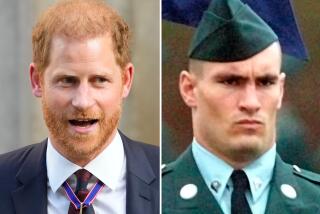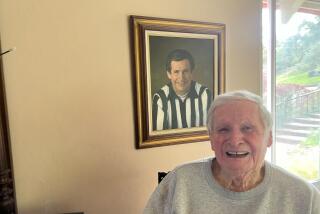The True Meaning of Sacrifice
- Share via
Today in New York, amid the smell of money and tingle of fame, the NFL will hold its annual draft of young men who will use their extraordinary physical gifts to play a game.
One can hardly imagine any of them forsaking their futures and using those gifts on behalf of their country.
Yet that was Pat Tillman, former safety for the Arizona Cardinals, dead in Afghanistan at 27, alive forever in our vision of what is best about America.
For Tillman, the important interceptions weren’t made on a football field, but the front lines.
For Tillman, the real tackles weren’t the ones made to inspire your team, but to secure our neighborhoods.
For Tillman, the only guaranteed contract was one you sign with your flag.
This weekend, athletes everywhere will stand at attention as the national anthem is played at sporting events.
Remember Pat Tillman as the one of the few in the last 50 years who actually listened.
He considered his life of no greater value than the lives of any of the others who have died in the war against terrorism. He believed this with such fervor that he refused all publicity after leaving the Cardinals and a $3.6-million contract offer to join the Army for $18,000 a year in the spring of 2002.
But to a war-weary country questioning the depth of its patriotism, he provides an inspiring, eye black-smeared face.
Amid a sporting landscape filled with whiners and malcontents, he offers a conscience.
Baseball players Ted Williams, Warren Spahn and Willie Mays joined other pro -- and college -- athletes in the military during World War II and the Korean War.
But star athlete-soldiers have been scarce in the five decades since and, with sports’ high salaries and huge popularity, it would probably take another breathtakingly courageous long-haired dude to volunteer again.
“I have a big picture of him in my office, vintage Pat Tillman,” recalled Doug Tammaro, associate media relations director at Arizona State, where Tillman played his college football. “He’s tackling a guy from behind. And the guy is bigger than him. I walked in today, looked at the picture and started crying.”
The sports world joined him Friday, weeping not only for the death of a man who probably would have returned to the playing field, but also for the loss of an ideal that no longer grows on that field, having long since been choked by the weeds of entitlement.
This is the week that Eli Manning, the projected top pick in the NFL draft today, has hinted that he’ll sit out a season if he is not chosen by a team of his liking.
This is the week Gary Payton, the Lakers’ veteran guard, has grumbled about his playing time, even though his team won both playoff games while he was on the bench.
This is the week Pat Tillman died in pursuit of the Taliban.
“What he did, who he is, is way above anything we’ve seen in our world,” said Dave McGinnis, Tillman’s coach with the Arizona Cardinals.
A couple of years ago, McGinnis had been told by Tillman, his budding star, that he was walking away from football to join the Army.
“I was shocked, but not surprised,” McGinnis said. “Because I knew Pat.”
Tillman was, after all, the overachieving linebacker from Arizona State who’d tripled the scheduled time of his first pro workout.
“We were supposed to work him out for 15 minutes, but we were out there 45 minutes,” said McGinnis, who was fired by the Cardinals after last season. “He wouldn’t leave until he got everything right. I can still see him with his shirt off, diving at the ground.”
Tillman was the eccentric one who, when he wanted to think, would climb halfway up one of Arizona State’s light towers.
Tillman was the defiant one who, when his college coaches dared to removed him from the game during an opponent’s drive, would run off the field defiantly shouting, “Touchdown!”
Tillman was the simple one who, in 1998, became perhaps the only NFL rookie who rode to work every day on a bike.
“He was the one of those people who you never forget,” McGinnis said.
The first clue to his most unforgettable act was offered on Sept. 12, 2001. In a television interview about the tragedies of the previous day, Tillman didn’t sound like the usual professional athlete offering cookie-cutter remorse.
“My great-grandfather fought in Pearl Harbor, my family has fought in five wars, and I haven’t done a damn thing,” he said at the time.
Eight months later, he made good on his anger, walking into McGinnis’ office and pulling a chair around the desk so the two men were face to face.
Tillman was a record-setting tackler. He was a team leader. McGinnis thought he might be accepting their contract offer.
Instead, he told his coach he was joining ... the Army? Said McGinnis: “He talked about his sense of honor and duty. I told him about the ramifications. He said he didn’t care.”
Said Tammaro: “I received the call later that morning that he was joining the Army and I’m like, ‘Whaaat?’ ”
The next half year of Tillman’s life were spent in seclusion with an elite U.S. Army Ranger division.
He refused all interview requests, because, McGinnis said, “He said he wasn’t any different than any of the other young men and women over there.”
He surfaced only after his return from his first tour of duty in Iraq. One of his last friends to see him was Tammaro, who was in Seattle in January with the Arizona State basketball team. Tillman and his brother Kevin, who’d joined up with Pat, were stationed 45 minutes away at Ft. Lewis.
“I told him I would drive down and meet him for dinner,” Tammaro said. “He said, ‘No, I’ll come up there, save you the trip.’ ”
A reporter wanted to join them. Tillman politely said no.
He and Tammaro met at a funky dive where they spent a long night sharing stories and laughing.
“The amazing thing was, he was asking me all the questions,” Tammaro said. “That’s just like Pat, always thinking about somebody else.”
Tammaro said he’d told Tillman that he looked more muscular. He said Tillman responded with, “That’s only because I’m wearing a lot of shirts.”
He said Tillman talked about being the best soldier he could be.
They didn’t talk about death. They were too busy with life.
“When he left, he was walking up a hill and looking back at me and saying, ‘Hey, tell everybody I said hi,’ ” Tammaro recalled. “Looking back on that night, I thought he was invincible.”
His memory should live forever. He should get an immediate spot in the Pro Football Hall of Fame. He’s already clinched the title of 2004 sportsman of the year.
And his influence should be felt during that silly little draft today.
War rooms? Please. Warriors? C’mon.
At that silly little draft, there will undoubtedly be a moment of silence in honor of Tillman.
Those gifted, clueless young men would learn a lot more if there were an hour of cheering.
*
Bill Plaschke can be reached at bill.plaschke@latimes.com. To read previous columns by Plaschke, go to latimes.com/plaschke.
More to Read
Go beyond the scoreboard
Get the latest on L.A.'s teams in the daily Sports Report newsletter.
You may occasionally receive promotional content from the Los Angeles Times.











